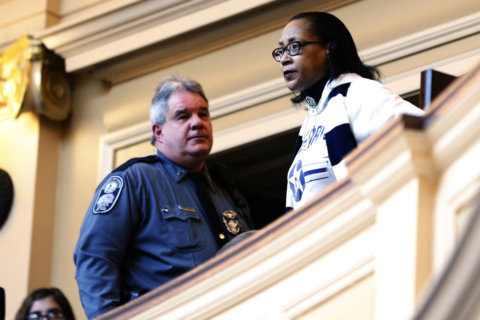RICHMOND — With Virginia’s top politicians intent to remain in office despite a series of controversies, a powerful speech Thursday on the House floor called for change across the state.
Del. Jay Jones, a Democrat who said he spoke only for himself and not the black caucus, called on people to address the admissions from Gov. Ralph Northam and Attorney General Mark Herring that they once wore blackface, and the associations of other lawmakers with similar actions or photos.
A House dispute over how to handle separate sexual assault accusations against Lt. Gov. Justin Fairfax also moved into the public eye.
“Over the last several weeks, deep wounds have been opened within Virginia,” Jones said. “I have spent the last few weeks alternating between anger, grief, angst, despair, physical and emotional pain.”
A major concern for him is that people were surprised that racism existed in the 1980s, let alone today.
“That surprise has been a luxury to many Virginians. Most of them white. For many of us in this chamber, and millions of people around the country, the events that have gripped Virginia, they weren’t an aberration, an abstraction or an anachronism. They aren’t a unit in a history book. To me and many people like me, these events are a window into a struggle that defines daily life for black Americans from the day we are born until the day we die,” Jones said.
The speech came on a day Northam skipped an event at historically black Virginia Union University at the request of student leaders. Northam had planned to launch a “reconciliation tour” by attending the event, but instead invited the honorees who were part of a 1960s sit-in to the Executive Mansion Friday.
Procedural debate on how to handle a separate issue — the two sexual assault accusations against Lt. Gov. Justin Fairfax — also spilled back into public view late Thursday. Fairfax denies committing any sexual assault.
House Republicans accused Democrats of standing in the way of a special committee that might be able to hold hearings on the issue as requested by Fairfax’s two accusers.
Speaker Kirk Cox said he now wants to provide the accusers an opportunity to speak publicly at a subcommittee of the House Courts of Justice Committee.
House Minority Leader Eileen Filler-Corn responded with a letter to Cox accusing Republicans of failing to live up to their word in discussions about the committee by not providing a written plan for how and when things would move forward under Cox’s proposal.
Discussions are ongoing, but it is unlikely any hearings will happen before the session ends this weekend. Subcommittees can be set up and meet when the legislature is not in session. One of the accusations, tied to a 2004 encounter in Boston, is now being investigated by law enforcement there.
Cox said any subcommittee would be a formal proceeding, but not necessarily an impeachment hearing, that would be easier to set up before the session ends. Such a committee could have limited subpoena power, House Majority Leader Todd Gilbert said.
The accusations against Fairfax were made publicly when it appeared he might become governor. Northam has since made clear he has no plans to resign.
Two Virginias
Jones called for urgent action to bring Virginia together, to avoid further pain and despair over racial disparities, but said that must include second chances and forgiveness.
“The picture isn’t of one Virginia, it is of two Virginias — a white Virginia and a black Virginia — existing in parallel along the same arc of history, frequently intersecting, but never running together as one,” Jones said of the 400 years since European settlers established a legislative body and the first Africans arrived in Virginia.
“The white Virginia that perpetuated segregation, massive resistance, the glorification of the Confederacy via monuments and flags in public spaces and other mechanisms which consciously or unconsciously attempted to demonstrate its power over black Virginians; the black Virginia that is still oppressed by the vestiges of Jim Crow in our legal system, that fears law enforcement, is mocked in yearbook photos year after year after year, and looks skeptically at white Virginia because of generations past,” Jones said.
“These two Virginias have coexisted in inequality for four centuries, but we may now finally be reaching a tipping point. The lasting wounds of the two parallel journeys have been reopened,” he said.
“I believe deeply in my bones that we can walk together shoulder-to-shoulder for the good of this commonwealth, but it will take a desire to address that which is uncomfortable, and every ounce of compassion that we can summon within ourselves,” Jones said.
Jones pointed to the many roadblocks faced by his parents and grandparents, that his father pushed through to become a state delegate. Jones’ father spoke against a Confederate flag license plate on the House floor due to the flag’s associations with cross burnings.
“To him and others, these symbols mean hate and vitriolic racism,” Jones said. “It is part of Virginia’s history, whether we like it or not,” he added.
He recalled an incident while with his father at a General Assembly retreat: He was playing with other children of legislators, and the wife of a white lawmaker told her daughter not to play with him because of his skin color.
“It was also the casual racism. The subtle comments, the jokes from white acquaintances who had the luxury of thinking about race as fodder for humor,” Jones said. “I cannot stand here and say that my experience has been markedly different than the generations before me.”








